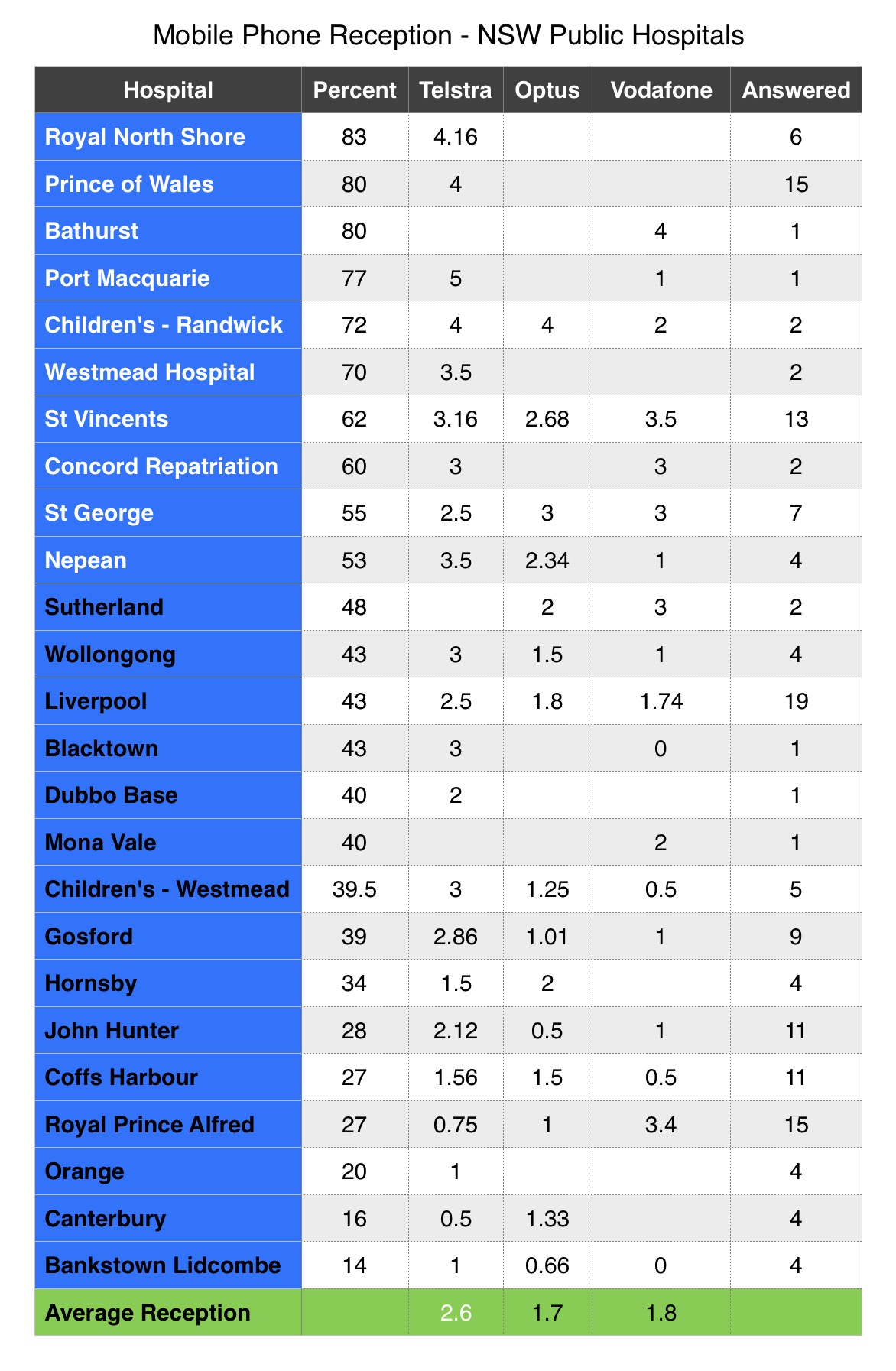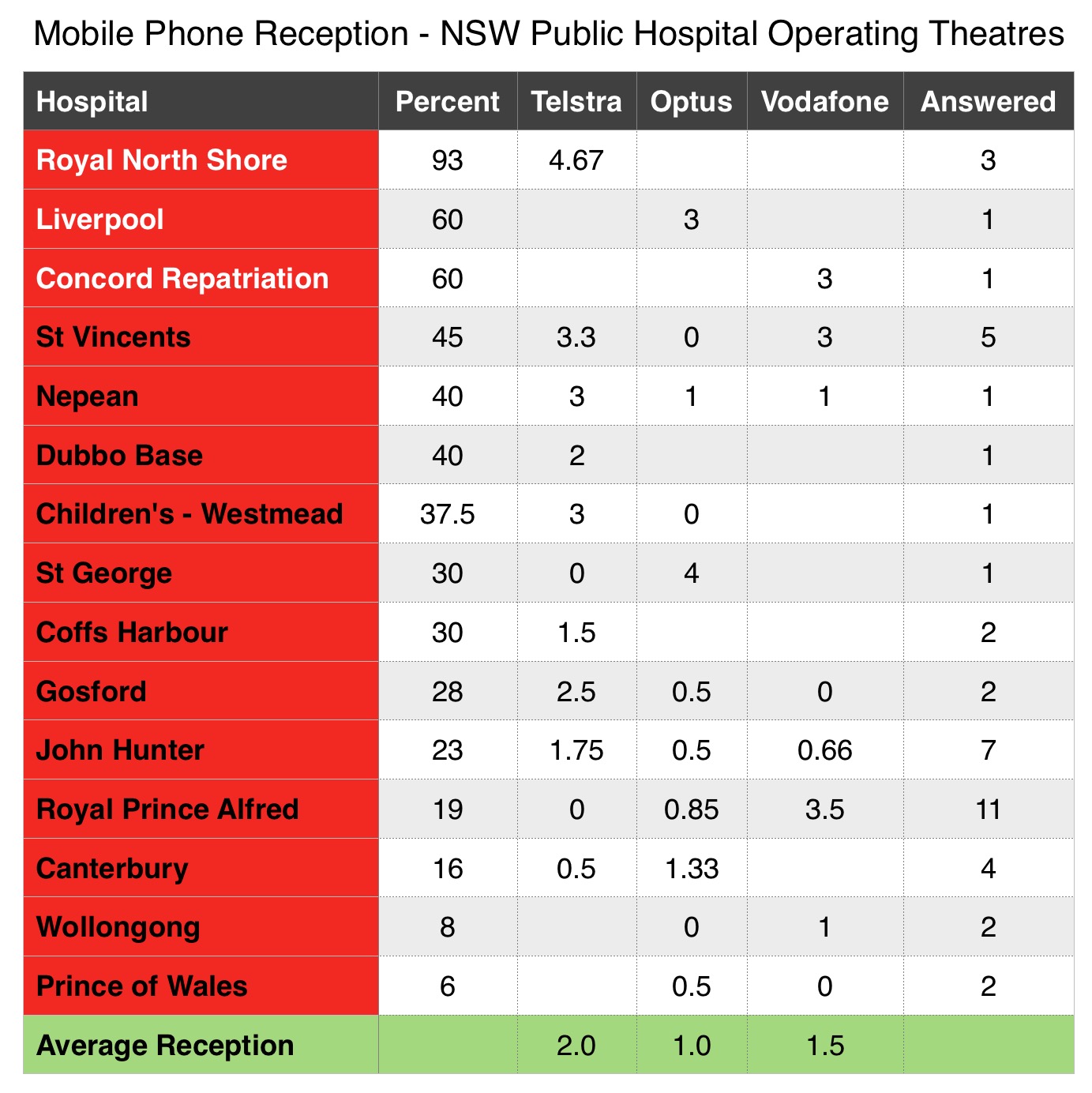
We’re trying to improve mobile phone reception in hospitals in the interest of better patient care. Australian hospital staff can you help?
Please consider completing & sharing this very brief (<1min) survey:
Perhaps one of the greatest obstacles to optimal patient care is an inability for front line staff to communicate efficiently, effectively and reliably within the ever increasing complexity of our hospital systems.
Some who work outside healthcare may believe that hospitals are bereft of decent mobile phone reception because it interferes with medical equipment. There is no evidence that mobile networks have any negative impact on medical equipment – this fact has been known for some years now (see here).
That mobile phone reception is poor in many hospitals is mainly due to hospital design and wall thickness. This can easily be overcome through implementing Digital Antenna Systems (DAS) within hospitals. Where this has been done mobile reception is great. However in many instances DAS systems have been introduced for one network carrier (e.g. Optus) and not for another (e.g. Vodafone) – this in effect makes the system defunct as hospital staff use different networks. Network carriers can ‘piggyback’ on to other carriers DAS systems and we encourage carriers to work in collaboration to allow this to happen throughout our hospitals.
Many people who work outside healthcare are astonished that we still rely on inefficient paging systems as our primary means of communication.
‘Pagers have several drawbacks. Invariably in a busy work environment, people move about and telephones are a pooled resource that quickly become engaged. As someone is paged, they answer the call to find either that the number given is now engaged, or that the caller has moved on to another ward location. The end result is often a game of ‘telephone tag’. The provision of mobile telephones bypasses many of these problems. The call set-up delays inherent in paging are eliminated, and the number of communication access points is multiplied through personal handsets.’ (see here)
Surveyed front line staff support the use of mobile phones as a primary means of communication and recognise they are much more efficient than paging systems. (see here)
We believe that paging systems should be retained in hospitals (for now) as a vital back up form of communication in the event of the collapse of a mobile network (see here).
Please complete and share this survey assessing mobile reception in Australian Hospitals (click here).
We aim to start publishing the data in early May to demonstrate where mobile reception can be improved in the interest of patient care. This information will be provided to mobile network providers and healthcare governing bodies and made generally available to encourage the introduction of reliable mobile phone reception in hospitals.
When health systems market themselves as having state-of-the-art technology, consumers have a right to expect the claim to be true. (see here)
After 500 responses we now started to collate the data and will present and update it as we have time to crunch the numbers. Below is the data collected so far for NSW Public Hospitals:

Percent: The percentage of the maximum obtainable score (e.g. if there were 5 bars of reception for each of the mobile carriers the percent would be 100). Please note this value is weighted based on the population covered by different mobile carriers (based on Telstra having 45%, Optus 27% and Vodafone 18%).
Answered: Refers to the number of staff from a particular hospital providing data for the survey. The greater the number the greater the strength of the data.
Numbers in the columns under each of the mobile carriers refers to the average number of bars (0 to 5) of mobile reception for that carrier in that hospital.
Please note the mobile phone reception in operating theatres is notoriously worse. This is a huge detriment to patient care given the importance and complexity of these environments. We have displayed mobile phone reception specific to operating theatres also:

Thank you for your support, please pass the survey on to others – the more data we have the better (click here).
Perhaps some of the stories below may help illustrate the issues posed by lack of mobile phone reception in many hospitals. We would be grateful to hear yours.
Typically if one staff member wants to get in touch with another the most rapid way is to
– contact the switch board,
– wait for the switch board to answer,
– request the pager number of the staff member they aim to contact (it’s not a guarantee the switch board will have it),
– put the phone down & page the staff member,
– hope that the staff member has the pager on them and it is working, and then wait the socially acceptable time (usually a minute or two) before paging them a second time if they haven’t answered. (Hopefully no one else calls on the phone you have paged from – this might lead to an engaged tone if the pagee is trying to call back).
– If there is no answer then phone switch board again and ask for the staff members phone number.
– Call the mobile phone number (if the staff member happens to be within the hospital it is highly unlikely they will receive the phone call as there is often no mobile phone reception). Perhaps leave a message on the mobile phone.
– Wait
– Call the switch board again and request the contact details of another member of that team (hopefully they know where the original staff member is).
– Repeat the process above for the second staff member.
Sometimes contact may not be made at all. Sometimes it is after 20 or 30 minutes of trying – often this affects the tone of the conversation from the off.
I liked the text page yesterday saying paging system down please present immediately to (somewhere) to collect hand held phone. Imagining every person in the hospital on a pager leaving what they were doing to go to a different location and collect a phone (while they probably already had their own in their pocket).
After the new hospital had been built the Obstetricians were invited in for a tour of the facilities. The first thing they did on walking in to the hospital was look at their mobile phones – on seeing they had no reception they refused to bring their patients there until the issue was resolved.
The paging system was down, there was of course no mobile reception, and the walking talkies had been turned off because listening to every single conversation had become too distracting to concentrate on the job at hand. When the arrest call went out the staff on the arrest team we really needed never got the message.
Do you have a story about how poor mobile phone reception has impacted negatively on optimal patient care? Please share it with us in the comments section below.
Thank you for your support.

2 Comments